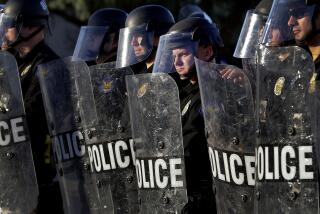Soviet Choice of Phoenix Spurs Skepticism
- Share via
The Soviet Union may help Phoenix Group International, a former real estate company that went high-tech, rise from the ashes.
Irvine-based Phoenix was tapped Monday by Soviet officials to participate in an equal joint venture to supply personal computers to schools in the Soviet Union and assist them in building factories to churn out their own PCs.
The selection was surprising--the small company beat out 16 other companies for the deal. It also raised some skepticism in some quarters because of the firm’s unusual history and the reputation of its chairman, Charles W. Missler.
Formerly known as the Woodmoor Corp., the company built residences in Colorado from 1963 until 1974, when it filed for bankruptcy. A few years later, with $1.5 million gained from the settlement of litigation, Woodmoor was able to get back into the real estate market.
But by 1987, management had decided to ditch real estate and look for a company to buy that would provide Woodmoor entree into high technology. A year later, Woodmoor settled on Missler Rossiter Ruggles Holdings Inc. of Newport Beach, which had been advising Woodmoor on investments and which was itself already investing in high-tech concerns.
Late last year, Woodmoor renamed itself, aptly, as Phoenix, the mythical bird that dies and then rises from its own ashes. Missler, 55, a self-avowed turnaround specialist, was named chairman.
The transformation called for Woodmoor to sell its real estate and use the money to invest in wobbly high-tech concerns that Phoenix could turn around. Missler Rossiter already held a stake in several high-tech firms: Resdel Industries, an Arcadia-based company that makes electronic equipment such as radar for the Pentagon; a 30% stake in Acculase, a San Diego maker of lasers for the medical industry, and a piece of Instant Circuit, a computer microchip concern.
Until 1983, Missler was the chairman of Western Digital, Orange County’s largest high-tech company. He was described by Jeffrey Kilpatrick, a local stock analyst at Newport Securities, as “very active in a lot of arenas. He is a deal-maker who is always into something interesting.”
Missler has cultivated a reputation as a turnaround specialist and in a recent interview claimed that he personally rescued six companies from Chapter 11 bankruptcy.
Not all of his deals have been so promising, however. There was Helionetics, for instance, an Irvine defense electronics manufacturer heavily involved in promoting advanced laser systems during the Reagan Administration.
Missler has been blamed for the company’s heavy losses and was forced out after two years as chairman. He was later sued for conflict of interest and agreed to pay the company $1.6 million in damages in an out-of-court settlement. The lawsuit alleged that he rejected a plan to have Helionetics acquire a small electronics firm and then used his inside knowledge to buy the company himself.
In the past year, Resdel Industries has had heavy losses and been forced to sell off many of its operations, laying off more than 100 workers. Phoenix recently said that Resdel is expected to return to profitability in the current quarter.
And Western Digital’s current chairman, Roger Johnson, doesn’t have fond memories of Missler’s management either. In a 1984 interview, he described Western Digital under Missler as a company with a good reputation for technology and a terrible reputation for execution.
Western Digital, he said, was unfocused and “the smallest, (most) undercapitalized conglomerate you ever saw.”
Missler is deeply enmeshed in Bible study, and has been involved in a massive project to use computers in deciphering what he described as coded messages contained in certain Bible passages.
For several years, he has led a popular Monday night Bible study seminar at Calvary Chapel in Costa Mesa, attended by up to 500 members of the independent Christian church.
Not all of Woodmoor’s investments have been in high-tech, nor have they all been successful either. A $75,000 investment in a company that franchised fast-food vending machines fizzled when the vending-machine company declared bankruptcy last year.
So far, Phoenix hasn’t caught fire yet either: It lost $1.4 million in 1987 and $1.1 million last year. Missler controls nearly 39% of the stock through a trust for his children. And he said Phoenix is doing better this year: It has broken even so far.
Investors evidently agree. The thinly traded stock jumped $1 Friday, apparently in anticipation of the Soviet computer deal. It rose another 25 cents today to hit $4 a share, equal to last year’s high.
The Soviet deal has its pitfalls, however, according to Kilpatrick, the analyst. Kilpatrick says he is “amazed” the Soviets picked a company with so “little history in assembling microcomputers.”
It is not the technical stuff that is worrisome, Kilpatrick said, adding: “All they need to do is go out and buy parts from various vendors and then bolt them together.”
But you have to put them together quickly, efficiently and inexpensively to make a lot of money. “And even some of the bigger independent computer makers have found that it is not all that easy to do,” Kilpatrick added.
(Main story in Part I, Page 1.)
More to Read
Inside the business of entertainment
The Wide Shot brings you news, analysis and insights on everything from streaming wars to production — and what it all means for the future.
You may occasionally receive promotional content from the Los Angeles Times.










